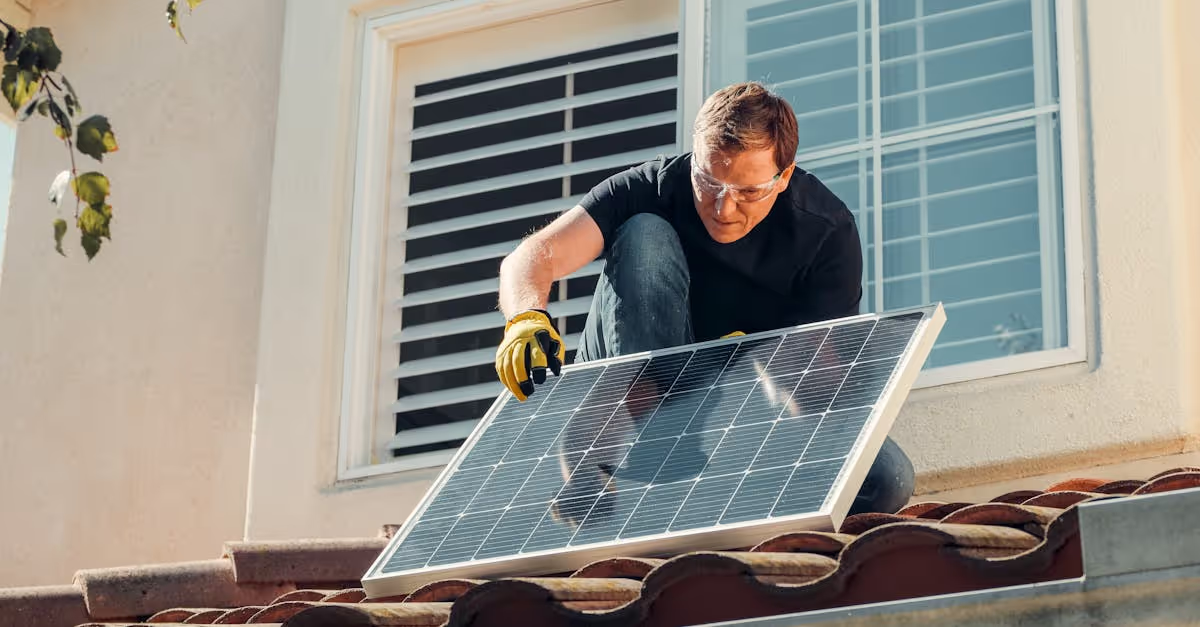Key Takeaways
- Water and Energy Efficiency: Eco-friendly pools drastically reduce water consumption and energy usage, leading to significant savings on utility bills.
- Cost Savings: Homeowners can save up to 70% on electricity costs and reduce chemical expenses by choosing features like solar heating and natural filtration systems.
- Environmental Impact: Adopting eco-friendly pools helps conserve water and minimizes chemical runoff, promoting healthier ecosystems and sustainable practices.
- Increased Property Value: Installing an eco-friendly pool can enhance property value, with some homes fetching up to 15% more due to their sustainable features.
- Variety of Options: Different types of eco-friendly pools, including natural, saltwater, and solar-heated designs, cater to various preferences while emphasizing sustainability.
- Maintenance Considerations: While eco-friendly pools may require unique upkeep, such as managing natural filtration systems, advancements in technology make maintenance more manageable.
As we dive into the world of eco-friendly pools, it's clear that making this choice isn't just about aesthetics. Did you know that traditional pools can consume up to 20,000 gallons of water annually? By opting for eco-friendly alternatives, we can significantly reduce water usage and chemical runoff, benefiting both our wallets and the environment.
Not only do these sustainable pools use less energy—cutting electricity costs by up to 70%—but they also promote healthier swimming conditions. With advancements in technology, maintaining an eco-friendly pool has never been more accessible. Join us as we explore the compelling financial and environmental advantages of going green with our pools.
Overview of Eco-Friendly Pools
Eco-friendly pools prioritize sustainability while providing recreational enjoyment. They minimize environmental impact and offer cost savings in operation and maintenance.
Definition and Features of Eco-Friendly Pools
Eco-friendly pools, also called green pools, incorporate features that promote water and energy efficiency. These pools often use natural filtration methods, reducing chemical use. They may include solar heating systems, which cut energy bills significantly. Innovative technologies, like automated pool maintenance systems, streamline upkeep, making it easier for homeowners to manage their pools sustainably. Additionally, they tend to incorporate energy-efficient pumps and LED lighting, further enhancing their eco-friendliness.
Types of Eco-Friendly Pool Systems
Several types of eco-friendly pool systems cater to different needs and preferences.
- Natural or Bio Pools: These pools employ plants and natural microorganisms for filtration, offering a chemical-free swimming experience.
- Saltwater Pools: Utilizing salt cells for chlorine production, saltwater pools reduce the reliance on harsh chemicals, promoting a gentler swimming environment.
- Solar Heated Pools: Solar panels capture sunlight, using it to heat pool water, which translates to lower energy costs.
- Inground Pools with Sustainable Materials: Using eco-friendly materials in construction can enhance sustainability efforts and aesthetics.
Each system presents benefits that contribute to reduced environmental impact, making them great choices for responsible pool ownership. By opting for eco-friendly systems, we embrace a growing community striving for sustainability in leisure activities.
Environmental Benefits
Eco-friendly pools offer both environmental advantages and financial savings. We can make a positive impact by embracing sustainable practices in our pool maintenance.
Water Conservation
Water conservation plays a crucial role in maintaining an eco-friendly pool. Using a pool cover significantly cuts down on water evaporation, reducing it by up to 95%. Regularly checking and repairing leaks in our pool systems helps prevent unnecessary water loss. Moreover, natural swimming pools minimize water waste as they don’t require frequent draining and refilling. This approach means we can enjoy our pools guilt-free, knowing we’re doing our part to save water. Isn’t it nice to feel like environmental heroes over summer barbecues?
Financial Benefits
Eco-friendly pools offer significant financial advantages. From lowering operational costs to increasing property value, these pools provide a return on investment that appeals to homeowners.
Lower Operational Costs
Lower operational costs standout as one of the primary benefits of eco-friendly pools. By integrating features like solar-powered pumps and energy-efficient LED lighting, we can see reductions in energy bills by up to 70%. Additionally, alternative sanitation methods, such as saltwater systems, lessen the need for expensive chemicals. Regular maintenance also becomes easier, thanks to advanced monitoring systems that help identify issues early. By reducing chemical and maintenance costs, we contribute to both our budgets and the environment.
Increased Property Value
Increased property value often follows the installation of an eco-friendly pool. Homebuyers show a strong preference for sustainable features, which can boost a property’s appeal. Studies reveal that homes with eco-friendly pools can fetch up to 15% more on the market. Moreover, the energy savings and low maintenance demands make our homes more attractive. An eco-friendly pool doesn't just provide enjoyment; it enhances our investment in real estate and promotes responsible stewardship of resources. It truly makes our properties stand out in a crowded market.
Challenges of Maintaining an Eco-Friendly Pool
Maintaining an eco-friendly pool comes with its own set of challenges. We need to address these issues head-on to enjoy the full benefits of sustainable swimming.
Initial Investment
Initial investment in an eco-friendly pool often proves higher than traditional options. Eco-friendly systems, like natural filtration or solar heating, might require larger upfront costs. For instance, installing a natural pool can run from $50,000 to $100,000, depending on size and features. These pools use plants and natural processes for filtration, which sounds great, but upfront costs can deter some homeowners. However, we must remember that long-term savings on energy bills and chemical purchases often offset these initial costs over time. What barriers did we face during our investment phase?
Ongoing Maintenance Considerations
Ongoing maintenance considerations for eco-friendly pools can differ from conventional pools. We deal with unique tasks like managing natural ecosystems and maintaining water quality without harsh chemicals. Regular monitoring of plants and microorganisms becomes essential. A monthly test of water quality, alongside routine cleaning to prevent algae growth, is necessary. Many vertically integrated software solutions, like service business software, can simplify this aspect of pool care. We can use technician scheduling tools for timely maintenance without the headache of remembering every detail ourselves. For example, setting reminders for water tests feels like having a personal assistant for your pool.
How do we balance eco-friendly practices with the necessary upkeep? What systems have worked best in our collective experiences? Sharing these insights can help us find innovative solutions together.
Conclusion
Embracing eco-friendly pools isn't just a trend; it's a commitment to sustainability and financial wisdom. By choosing these innovative systems we can enjoy our pools while significantly reducing our environmental impact. The benefits extend beyond water conservation and lower energy bills to enhancing our property value.
As we invest in eco-friendly options we’re not only making a smart financial decision but also promoting responsible resource stewardship. With advancements in technology maintaining these pools has never been easier. Let's continue to explore and share our experiences in creating beautiful and sustainable outdoor spaces. Together we can make a difference while enjoying the pleasures of pool ownership.
Frequently Asked Questions
What is an eco-friendly pool?
Eco-friendly pools, also known as green pools, prioritize sustainability and environmental responsibility. They utilize natural filtration methods, solar heating, energy-efficient pumps, and LED lighting to minimize chemical use and reduce energy consumption. These pools offer recreational enjoyment while promoting responsible ownership and water conservation.
What are the benefits of eco-friendly pools?
Eco-friendly pools provide significant financial and environmental benefits, including reduced water consumption, lower electricity costs (up to 70%), and decreased chemical runoff. They can increase property value by up to 15% and enhance sustainable living practices, making them appealing for both personal enjoyment and as real estate investments.
How do eco-friendly pools help conserve water?
These pools minimize water waste by utilizing natural filtration systems that don’t require frequent draining and refilling. Using pool covers can profoundly decrease water evaporation by up to 95%, and regular leak checks help prevent unnecessary water loss, promoting efficient water usage.
Are eco-friendly pools more expensive to install?
Yes, the initial costs for eco-friendly pools can be higher than traditional ones, with systems like natural filtration or solar heating ranging from $50,000 to $100,000. However, these upfront costs are often outweighed by long-term savings on energy and chemical bills.
What maintenance challenges do eco-friendly pools present?
Maintaining eco-friendly pools may require more attention to natural ecosystems and regular monitoring of water quality without harsh chemicals. While upfront costs are higher, ongoing maintenance can be simplified with software solutions that help schedule tasks and balance eco-friendly practices.
What types of eco-friendly pool systems exist?
Various eco-friendly pool systems include natural or bio pools, saltwater pools, solar-heated pools, and inground pools made with sustainable materials. Each type contributes to reduced environmental impact and promotes responsible pool ownership while offering recreational enjoyment.
Can eco-friendly pools affect property value?
Yes, homes with eco-friendly pools can increase property value by up to 15%. By integrating energy-efficient features and promoting sustainable practices, these pools become more attractive to potential buyers, enhancing overall market appeal.






